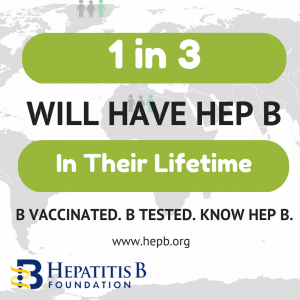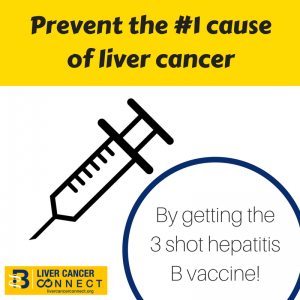 While World Immunization Week takes place during April, World Immunization Day is TODAY, November 10th! The World Health Organization (WHO) established the day to raise awareness for vaccines as a cost effective and low-tech method of preventing illness and disease.
While World Immunization Week takes place during April, World Immunization Day is TODAY, November 10th! The World Health Organization (WHO) established the day to raise awareness for vaccines as a cost effective and low-tech method of preventing illness and disease.
Worldwide 84% of countries have hepatitis B immunization programs; yet only 39% provide the necessary birth dose to prevent hepatitis B. This is a huge gap that must be addressed if we are to meet hepatitis elimination goals by 2030.
To celebrate World Immunization Day, here are some facts about the hepatitis B vaccine!
The safe and effective vaccine provides lifetime protection against hepatitis B, the most serious common liver infection in the world. The vaccine is a series of 3 shots given over a 6-month period, typically at 0, 1 and 6 months.
There are minimum time periods that are needed between each dose. The second dose is given at least 4 weeks after the first dose; the third dose is given at least 8 weeks after the second dose, and there must be at least 16 weeks between doses 1 and 3.
After the 1st dose of HBV vaccine, there can be up to 50% protection. After the 2nd dose of HBV vaccine, there can be up to 80% protection. It is very important to receive the third shot to ensure maximum, long-term protection.
If your vaccine schedule has been delayed, you do not need to start the series over, you can continue from where you have left off – even if there have been years between doses.
CDC, AAP and WHO recommend the birth dose for ALL newborns within 24 hours of birth because newborns and babies are at the greatest risk of developing lifelong, chronic infection if they are exposed to the hepatitis B virus. Giving the “birth dose” of the hepatitis B vaccine after a baby is born helps to reduce the risk of transmission to this very vulnerable population.
Perinatal prevention is especially critical for babies born to women who are infected with hepatitis B. All pregnant women should be screened for HBV. If positive, mom should be referred to care, and her baby should receive the birth dose of the vaccine and shot of hepatitis B immune globulin (HBIG), if available, within 12 hours of birth.
In order to meet this requirement, the first dose of the hepatitis B vaccine must be the “monovalent vaccine,” which means it is only the hepatitis B vaccine.
Many countries provide the “pentavalent vaccine”, which protects against 5 diseases, including hepatitis B. Unfortunately, the first dose of the “pentavalent vaccine” is given at 6 weeks, which means babies are not protected at birth and during the first 6 weeks of life against the hepatitis B virus.
It is very important that babies receive the “monovalent” hepatitis B vaccine at birth (not the “pentavalent vaccine”) in order to protect against a lifelong chronic hepatitis B infection. Babies must complete the vaccine series according to schedule. This can be done singly with the HBV monovalent vaccination or in combination with other vaccines (pentavalent, hexavalent etc.) Babies born to mothers that are hepatitis B positive should follow up with post-serologic testing at 9 months or a year to ensure the baby is protected against the hepatitis B virus.
There is no second chance to protect a newborn or baby from hepatitis B!
If a child, adolescent or adult missed the hepatitis B vaccine, they can be vaccinated at any time. For adults, it is never too late to start the hepatitis B vaccine (unless you are already infected with the hepatitis B virus, or have recovered from a past infection).
 For more information on hepatitis B vaccine in babies or children, consult the “Summary of Recommendations for Child/Teen Immunization.” For more information on hepatitis B vaccine in adults, consult CDC’s Recommended Adult Immunization Schedule.
For more information on hepatitis B vaccine in babies or children, consult the “Summary of Recommendations for Child/Teen Immunization.” For more information on hepatitis B vaccine in adults, consult CDC’s Recommended Adult Immunization Schedule.
Be sure to talk to your doctor about getting the hepatitis B vaccine (if you have not already). Not only does it protect against hepatitis B, but also hepatitis D and help prevent liver cancer!
References:
https://medgenomelabs.wordpress.com/2015/11/10/world-immunization-day/

